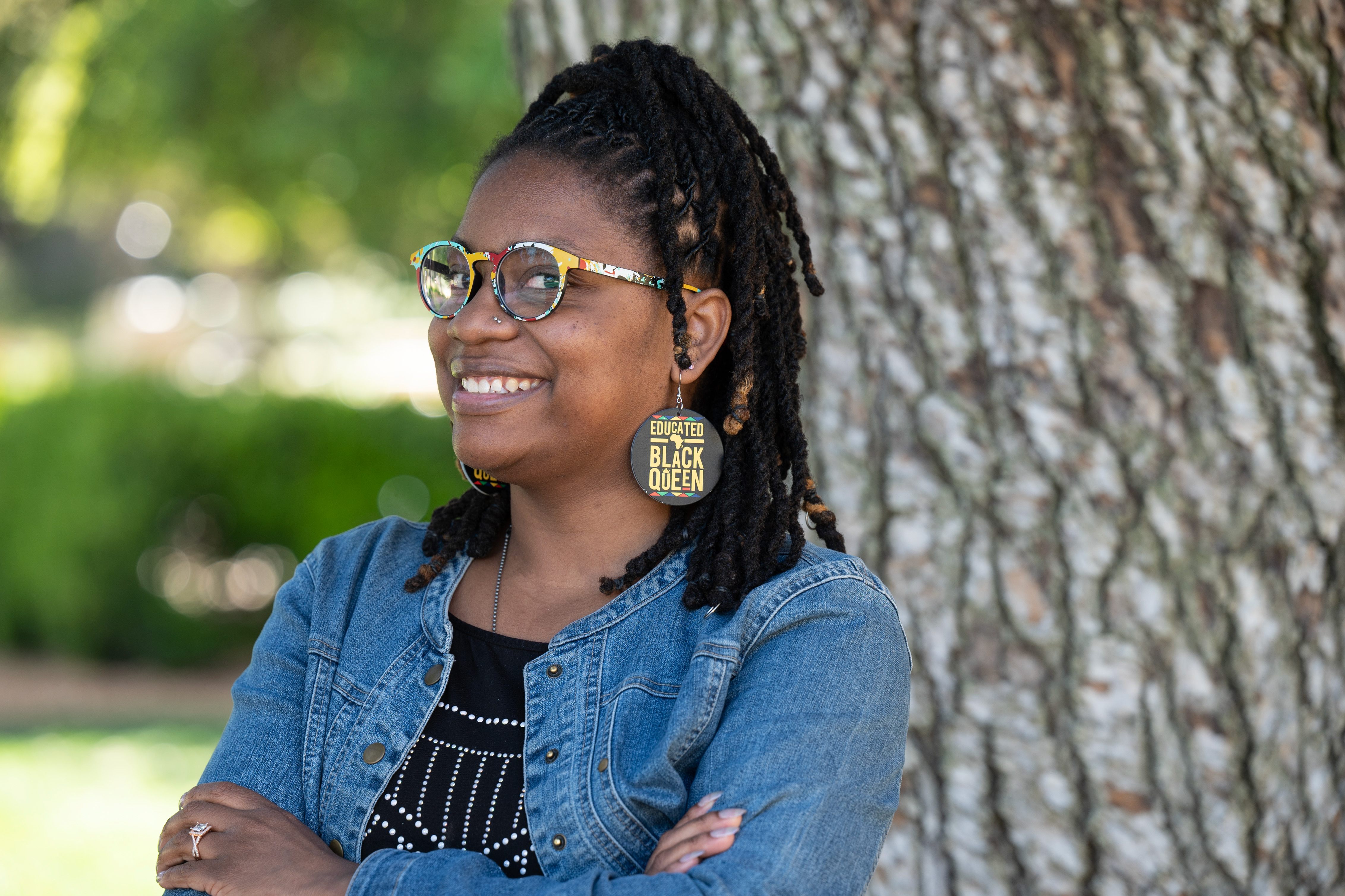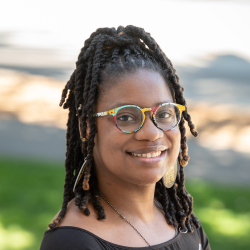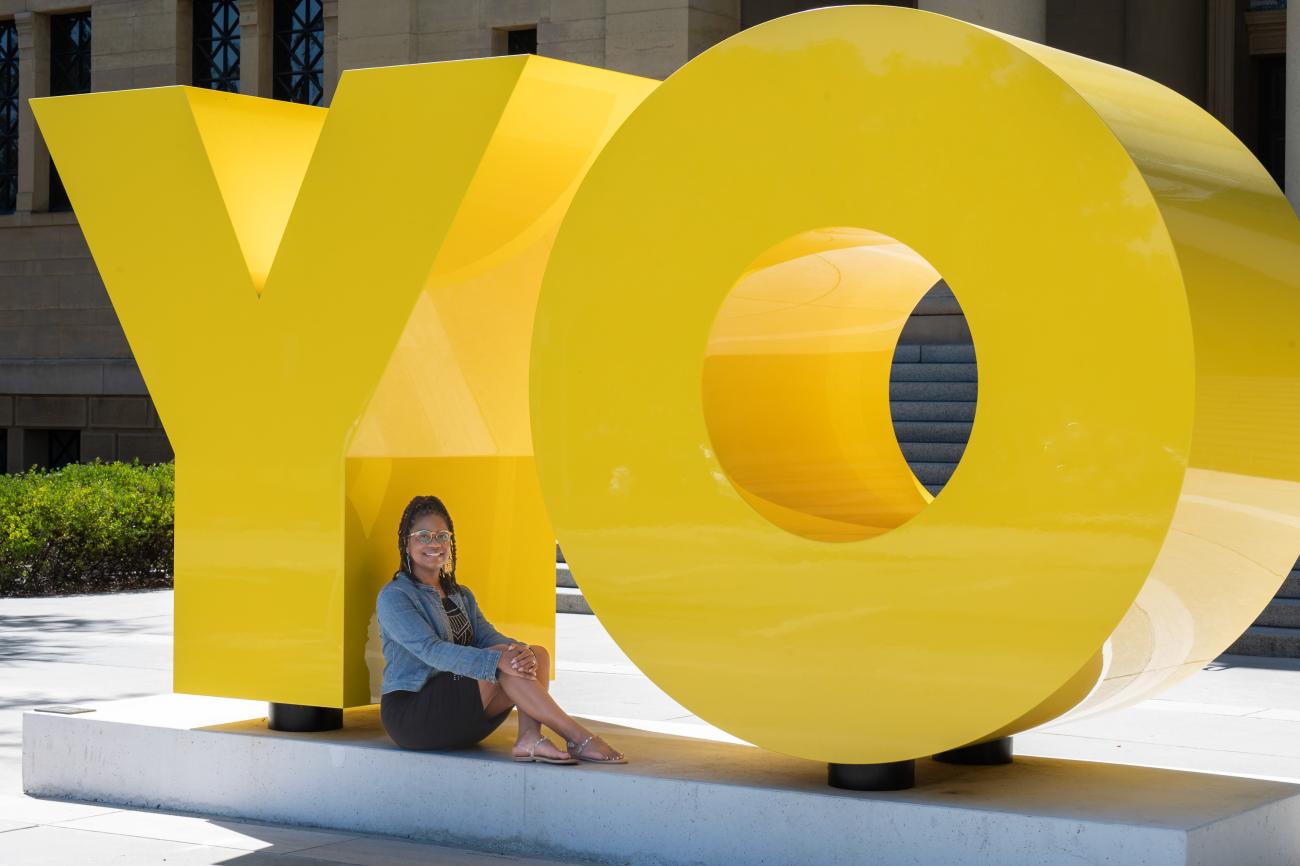
Shameeka “Smeek” Wilson
What drew you to study education?
In the words of a good friend, “I did not choose education; education chose me.” At 20 I kind of hit rock bottom and I was looking for a volunteer position to do some good in the world. I ended up working as a tutor in the local school and fell in love with working with students. They bring their full self to the space, quirks and all, and I appreciated that. That, mixed with a childhood memory of a Deaf boy in my neighborhood, drew my attention to studying Deaf education. The program provided certification in special education as well. Our family is also full of teachers – my mom having taught for 25+ years – so I was always in a school doing things and helping my mom in her classroom.
What were you doing prior to applying to the GSE?
I worked as an elementary special education teacher with multilingual learners with disabilities. I also worked as a habilitation technician for families with children with multiple disabilities, providing reprieve while aiding the children in gaining life skills for greater independence. It was a pleasure and so rewarding.
Is there anyone who inspired you to pursue advanced study in education?
A professor at UNC-Greensboro was definitely the catalyst for my desire to complete a PhD. Our cohort had taken a trip to Gallaudet University to visit the Kendall Demonstration Elementary School and the Model Secondary School for the Deaf when this professor and I were having a chat. I had never heard of a PhD and no one in my family had a PhD, so I had no point of reference. She told me that I would be perfect for a doctoral program, and that inspired me to investigate. From that day forward, I knew it wasn't a matter of “if” but “when,” and created a plan to follow the dream.
What was the focus of your master’s or qualifying project?
My qualifying project sought to understand the lived experiences of Black women teacher educators teaching in predominantly white-staffed school districts. The focus of this project was to understand the experiences of administrative discipline of Black women teachers in these schooling contexts and the impact of this discipline on their desire to remain in or leave the teaching field.
What research are you pursuing at Stanford?
Currently, my research uses a transdisciplinary approach to focus on the discipline that Black women teachers experience from their administrations in Southern K-12 schools.
What surprised you about Stanford once you got here?
The sheer amount of opportunity on this campus is jarring. At every turn there is another initiative, leadership opportunity, or teaching assistantship. And the fact that Stanford has a jump rope club and you can join the band without any prior experience – that was mind-blowing and fun to participate in.
How would you describe the other doctoral students in your program?
Simply put, brilliant. They represent a myriad of experiences from a wide range of backgrounds. And they study a wide range of critical topics within education, such as abolition, eugenics, history of education, and science education. The other doctoral students in my cohort are just dope! They continue to show up – whether it be on campus, within their chosen communities, or in K-12 school partnerships – and continue to learn and gain expertise that they will carry with them in whatever capacity they choose. I know their impact on the world will be profound and I'm excited to witness it.
Are there any particular highlights of your time at Stanford?
I have to say, having had no experience in a formal band before and playing the quads on the field at the Cal-Stanford game was a highlight. It's something I recommend everyone to do at least once. Join the band and play at a football game.
Is there some time that you spent with a member of the GSE faculty that you found memorable?
I’ve had some incredible times with GSE faculty, but some favorites include: cozy kickbacks at Dean Anne Charity Hudley’s house with good food and good people; walking around San Francisco’s Mission District with Jonathan Rosa and learning about the art and rich traditions there; going on walk-and-talks with Janet Carlson; and working with Alfredo J. Artiles, who is a kind and generous mentor.

What do you do to relax and have fun?
I enjoy completing word searches to relax. It also gives me the opportunity to passively learn new words and think about new activities to try. I also enjoy baking and learning to cook with friends. I enjoy writing retreats and game nights with friends. I am probably getting old, but there is nothing like sitting on the couch in the still of the house and binge watching some good ol’ Netflix!
What are your career plans?
Careers plans are hard to pin down right now. Ideally, I'd love to be a university professor preparing pre-service special education teachers to work with multilingual learners. And/or I’d like to work at a community college assisting students in transfering to universities, because prior to coming to Stanford, I was a community college transfer student to a public university. I could also see myself being a professor of linguistic anthropology who partners with school districts to research issues related to race, language, and inequities in schools.
What future research do you hope to pursue?
I hope to complete future research as a linguistic anthropologist to gain a greater understanding of how language works in the world around us. What language practices do people use and why do they use them? Where do they shift or change how they use their language practices, and what is their impetus for making such changes? I am very interested in understanding how language can be used to fight monolingual and oppressive dominant language ideologies for historically and currently marginalized populations that speak another language and/or a different style of language. Basically, I'm interested in all things language. As Dr. Jonathan Rosa says, “Language is fascinating” – which it is. There are so many subtle nuances to language that once you learn how intricately and brilliantly they work together you'll want to research language as well.
What impact do you hope your work will have?
I hope my line of work will create opportunities for more students in special education to have the opportunity to participate in Dual Language Bilingual Education (DLBE) programs while they're going through school. I hope my line of work will create policies that hold those working in educational leadership accountable for their actions in the workplace related to the treatment of Black teachers. I hope my work will display the genius of language so that more policies can be created to eradicate monolingual and White supremacist ideologies in language learning for historically and currently marginalized people and I hope my work makes it easier to be a Black teacher – especially a Black woman in America’s teaching force.
What advice do you have for prospective students on the application process?
The advice I would give the students is to ensure that you give yourself enough time to complete the application process. Application processes are multifaceted and have a lot of moving parts. It is beneficial to set up a timeline using the form of time management that serves you. For me, that’s a desk calendar. Doing this can aid in giving your references enough time to provide a quality letter for you and give you time to work on your statement of purpose. Additionally, when writing your Statement of Purpose, lean in to the experiences that inspired you to apply to Stanford and find a way for those experiences to shine through in an authentic manner.
Any tips for incoming students to help them get the most from their time here?
Write out your goals and map them across the 5+ years you are going to be here. There are so many opportunities here, but taking on too much can be counterproductive. Take the ones that align with your goals. Find your people and tell them your goals so they can hold you accountable if you start trying to talk your way out of your brilliance. And always ask questions. Your dream is never too big.
Looking back, what would you like to have told yourself on the first day of your PhD?
I would tell myself to relax and surrender to the process. The process of pursuing and earning a PhD is not linear and it is not easy. I would encourage myself to be kind and graceful to myself and to make room for the learning curve. I would also tell myself to memorize the serenity prayer and incorporate many things within my schedule that keep me grounded and close to my familial roots.

Photos by Rod Searcey
